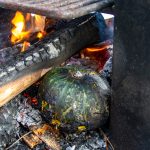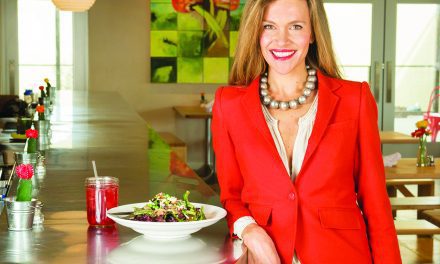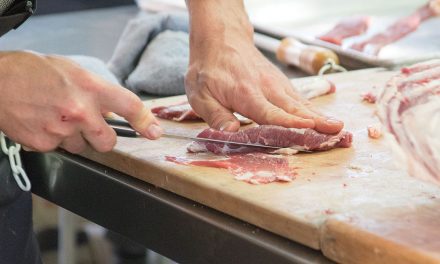Ras Rody Brings Farm-fresh Vegan
Jamaican Cuisine to Santa Fe
By Joanna Manganaro Toto · Photos by Douglas Merriam

Ras Rody on his food truck, Ras Rody’s Jamaican Vegan Kitchen in Santa Fe.
When I lived in New York City in my twenties, I had an unlikely friendship that revolved around vegan food. It began while we were both working on a runway show in the pressure cooker environment that is New York Fashion Week. While my job entailed crawling around on the floor putting shoes on models and racing down city streets with awkward parcels of clothing clutched in my sweaty arms, hers involved wearing designer heels, clattering away on her laptop, and flattering Very Important Fashion People into submission, which made her a VIFP, as well, by association.
I’m still not totally sure why she chose to spend some very rare moments of free time with a scrubby underling like me, but I appreciated her insight and generosity, and I loved hearing all of the fashion gossip. We took to getting together every few months at the Greenwich Village location of Souen, a vegan macrobiotic restaurant that had gained a reputation for catering to fussy VIFPs, neurotic wellness junkies, people with food allergies (perceived and actual), or, as in my friend’s case, some combination of the three. Over unseasoned steamed vegetables, rice, and legumes, I basked in the glamorous glow of my fine-boned, Swiss-educated friend’s attention. Looking back, the food could not have been all that great—one of the “dressings” they offered was just smashed up carrots in water, I’m fairly sure—but I genuinely liked it. There was a sense of beauty in the austerity.
When I peered into the takeout box holding a combo plate from Ras Rody’s Jamaican Vegan Kitchen food truck in Santa Fe earlier this fall, I had a flashback to those dinners at Souen and thought, Got it. I know what to expect from this food. I could not have been more wrong. All the same elements were present—steamed vegetables, rice, legumes—but Ras Rody’s food delivered a wallop of flavor.
His vegetable blend was made vibrant and exotic with the inclusion of jackfruit, and a turmeric and coconut milk sauce provided a slightly sweet balance to the other savory components: squash, peppers, and potatoes. The black beans and chickpeas—tender, earthy, and seasoned to perfection—made an exquisite complement. Rounding out the combo plate were nutty, short-grain white rice and soy crumbles that resembled ground beef. Crunchy cabbage slaw, a corn fritter, and a single slice of plantain served as textural garnishes. On the side was the polar opposite of watery carrot “dressing,” a Jamaican jerk sauce with heat that caused me to jolt at first bite.
The combo plate, along with the soup, smoothie, and juice on Ras Rody’s small menu, changes frequently in order to showcase seasonal ingredients from the garden that springs up improbably along the border of the gravel lot where Ras Rody’s food truck is parked. When I ordered the banana, papaya, and kale smoothie, I watched Ras Rody saunter over to his garden, cut the kale, and bring it back to toss in the blender. It doesn’t get much more farm-fresh than that.
Ras Rody, a wiry father of nine, who was raised in the rural Westmoreland Parish of Jamaica, had a path to veganism that was different than most. When he was a child, he suffered a kidney malady that put him in the hospital for an extended period of time. His doctors determined that the cause of his condition was the consumption of too much meat and greasy foods. They forced him to fast for two months, and when they allowed him to eat again, they served him a plate of simply cooked vegetables. Later in life, as he was becoming close with the predominantly vegan Rastafarian community, Ras Rody recalled those weeks in the hospital when he found himself unable to eat meat. He ultimately chose to take up veganism himself and devoted himself to Rastafarianism.

Ras Rody explains the challenges that his lifestyle presented at that point. He says, “I had to develop food for myself because Jamaicans like fried foods—they like jerk chicken; they like meat. So, when I made the decision to be Rastafarian and to eat vegan food—we call it Ital food in Rastafarian—it was a struggle. Thirty years ago, nobody understood that kind of food. You couldn’t go anywhere and find anything to eat. Many days, you’d have to wait until you got home before you could eat. In comparison to today, you can find food everywhere. Those days, you had to be hardcore, man. You had to make it for yourself and have the discipline to keep doing it.”
Ras Rody realized he had a knack for cooking vegan food when even meat-eaters began clamoring for the dishes he would make, so he decided to try making a living from it. He set up his first food stand, Ras Rody’s Organics, on the street near a luxury hotel in Jamaica, much to the chagrin of the wealthy hotel owner. When hotel guests eventually began flocking to his stand, the hotel owner apologized for his initial poor treatment of Ras Rody and insisted that his business was an asset to the hotel.
Over the years, adventure and curiosity brought Ras Rody to the United States to visit, but love brought him to stay. He has lived with his wife, Michelle Wurth, in Albuquerque, Rhode Island, and Florida, sharing his vegan food and organic vegetables along the way. Just before the pandemic broke out earlier this year, Ras Rody, Wurth, and their son, Benge, made their home together in Santa Fe and set up a food truck to showcase Ras Rody’s cooking. Though it’s undoubtedly challenging to launch a new business during such a strange time, Ras Rody maintains an infectious sense of optimism. Of his happy customers’ response to his food, Ras Rody says, “It’s very encouraging.”
1312 Agua Fria St., Santa Fe, 505-385-3011, rasrody.com
Edible celebrates New Mexico's food culture, season by season. We believe that knowing where our food comes from is a powerful thing. With our high-quality, aesthetically pleasing and informative publication, we inspire readers to support and celebrate the growers, producers, chefs, beverage and food artisans, and other food professionals in our community.












